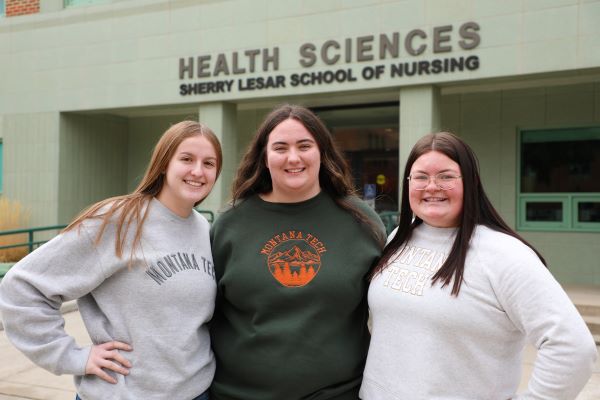Montana Tech nursing students lead successful peer mentoring program, present results at Arizona conference

Three dedicated Montana Tech nursing students presented their impactful research finding on their peer mentoring program in Arizona in March.
Nacole Sestrich, Megan Savage, and Maggee Nielsen, all seniors from Butte, delivered a Rising Star of Research presentation at Sigma Theta Tau’s Creating Healthy Work Environments 2025 conference.
“We are so proud of Nacole, Megan, and Maggee for their dedication in developing this peer mentoring program, the positive outcomes and for their acceptance to present their findings at a national conference,” Director of Nursing Janet Coe, MSN,RN,CHSE said. “Each exemplify nursing excellence and the ability to share their experiences and navigation of the nursing program is a great benefit to all those who follow in their footsteps."
Sestrich, Savage, and Nielsen, in collaboration with Executive Director of the Institute for Educational Opportunities Theresa Rader and Coe, revamped the Institute for Educational Opportunities’ peer mentoring program.
“Although nursing tutoring was previously available, students weren’t utilizing the services,” Nielsen said.
With their training complete, Rader assigned students to each tutor, marking the start of a proactive mentoring strategy.
“We actively reach out to students and establish a presence in their classes the first week of school, providing them with information about our services and location,” Nielsen said.
A lot of the focus is put on how to study and navigate nursing school, rather than content itself.
“Understanding instructor syllabi and developing a plan is fundamental for new nursing students. In this program, organization is key; you can’t succeed without a planner,” Nielsen said.
Nursing students also have to pass ATI tests as part of their program, which has questions that are modeled after The National Council Licensure Examination (NCLEX). The peer mentors help students learn how to study for those tests.
“The first couple weeks of class there are a lot of students coming in with ATI questions,” Sestrich said. “We show them how to use the platform and set them up with resources to help them study for those ATI tests later.”
The peer mentors know that there can be a stigma to asking for help, so they try to share their own experiences to make students comfortable.
“The transition from your pre-requisite courses to nursing is a pretty hard turnaround,” Savage said. “Before it was more of a memorizing thing and then in nursing you get more to applying what you learn.”
Using tactics gleaned from 60 years of student success in TRIO Programs, the results of assigned mentoring have been notable, with pass rates on some tests rising from 80% to 96% or 100%.
“I feel like it's a big accomplishment, because there's just something about sitting in the office talking to a student, and then seeing the light bulb go off that makes you feel like what you're doing is worth doing and you're actually benefiting more people than just like keeping the knowledge in for yourself,” Nielsen said.
All three peer mentors recommend that future nursing students participate in the program.
“It will set you up for success in the program,” Sestrich said. “You don’t have to struggle so much.”
Nielsen added, “You gain practical insights from those who’ve navigated the same challenges, rather than struggling by yourself.”